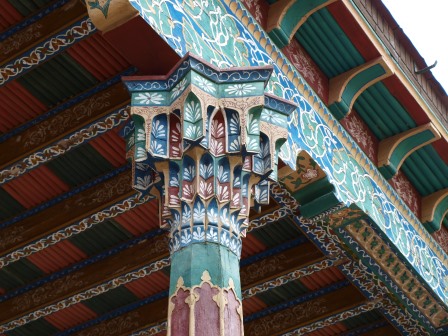I visited the Ferghana valley for the first time at the end of last week which means, I think, that I have been in all the viloyats of Uzbekistan except for Surkhandarya. I’ll try to get there before the end of the year. My first impression of the Valley was the contrast between the arid hills you go through on the way down from the Kamchik pass and the lush greenness of the irrigated agricultural lands in the valley proper. We passed orchards heavy with fruit and, in the villages and towns around Fergana, vines heavy with grapes. We saw fields of corn, rice and cotton. Melons and watermelons were stacked for sale by the roadside.
In the cities, I was struck by the amount of new or recent building, most notably in Andijan where two big boulevards with wide pavements and new buildings in a variety of styles have replaced the old city centre, and in all three cities I visited – Namangan, Andijan and Fergana – it was clear that a lot of investment had gone into new sports facilities, from full-size stadia to mini-football pitches and tennis courts. I met the city administration in all three places, along with representatives of the local chambers of commerce. The purpose of the visit was partly to look for opportunities for British business in the region, but more generally to see an important part of the country – the most densely populated part of Uzbekistan (in fact of central Asia), with 30% of its population, and also, as the city Hokims pointed out, historically a centre of cultural and spiritual development in Central Asia and a crossroads of ancient trading routes.
There’s an interesting juxtaposition of tradition and modernity: the latter in the new building projects, in the sports centres, in the efforts being made to implement the presidential decree on foreign language teaching (a particular interest for us because the British Council are doing a lot of work in support of the expansion of English language teaching in Uzbekistan); the former in the way people dressed – far more traditionally than in Tashkent – and, as one of the Hokims emphasised, in people’s mentality, for example in the respect that’s accorded to older people and to the family.
The director of the Kokand Regional Studies Museum (part of it located in the dazzling palace of the last Khan) pointed out to us a series of display panels set up for last year’s “year of the strong family”, showing families from the city, and recalled watching the 1970s film “Fun with Dick and Jane” and being amazed and amused at the scene where Jane Fonda’s character asks her parents to help her out when she is in financial difficulty and they flatly refuse.

